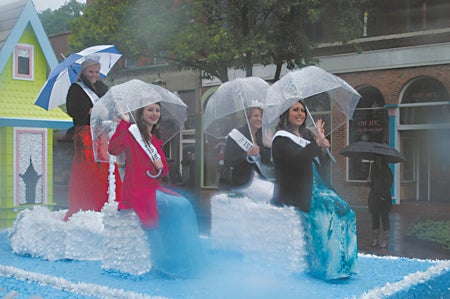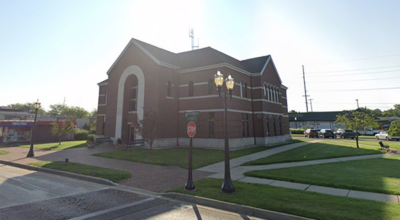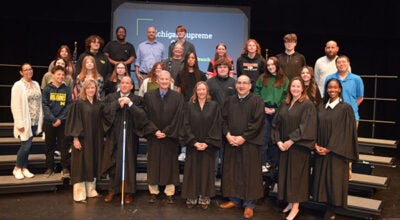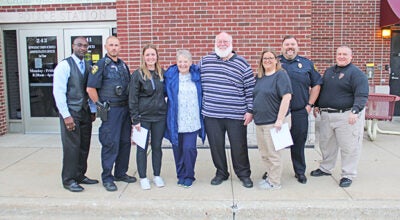Hains recalls Gettysburg Address
Published 5:07 pm Monday, May 27, 2013
Awash in “liquid sunshine,” Masons of Peninsular Lodge 10 braced themselves against 53-degree temperatures and pressed on with Memorial Day.
“The cost of our freedom has been measured down through time by those who sacrificed their lives for us,” Master of Ceremonies Brad Yazel said. “This is why we gather each year to remember our fallen comrades in arms, decorate the graves of our own loved ones and why we should pause for a moment in grateful reflection for those whose sacrifices secured our liberty, which so many in the world would like to take away from us. Freedom is never free, and it is constantly under attack.”
Mayor Donald Lyons, flanked by Mayor Pro Tem Leon Laylin and senior Councilman Bob Schuur, said, “The small price we’re paying today” by getting wet “is very, very modest compared to the price of those who have gone before paid for our privilege of being here.”
Schuur said he could not remember it ever raining during the Memorial Day parade in 28 years on the council.
“We’re long overdue,” Schuur said.
Deputy Police Chief Steve Grinnewald said it rained during his first parade 18 years ago, but Memorial Day precipitation remains rare.
Skip Cline of Cass County Veterans of Foreign Wars Post 1855 said this Memorial Day was the 200th anniversary of the War of 1812, the 150th anniversary of the Civil War, the 100th of the Moro campaigns (of the Philippine-American War), the 70th of World War II, the 60th of Korea, the 50th of the Vietnam advisory campaign, the 30th of Lebanon and Grenada, the 20th of Somalia and 10th of the Iraq war beginning.
“Our involvement in Afghanistan is coming to a close, with 50,000 troops scheduled to return stateside by year’s end. But the war on terror continues with last month’s bombing at the Boston Marathon. Once again, as always, our hearts go out to the families of those killed and injured in that tragedy. Remembrance is vital. Let’s remind our friends, family members, co-workers and especially the young of all the wars past,” Cline said.
Keynote speaker Lt. Col. Decker Hains, Western Michigan University professor of military science and a 1994 graduate of the U.S. Military Academy (West Point), recalled Nov. 19, 1863, when President Abraham Lincoln delivered his famous Gettysburg Address at the dedication of the Soldiers’ National Cemetery in Pennsylvania 4 1/2 months after the Union armies defeated the Confederacy.
In two minutes, Lincoln reiterated the human equality principles espoused by the Declaration of Independence and proclaimed the Civil War a struggle to preserve the Union shattered by southern secession.
Lincoln recast the Civil War as a struggle also for the principle of human equality, the iconic beginning “four score and seven years ago” referring to the Declaration of Independence written at the time of the American Revolution in 1776.
Lincoln extolled the virtues of preserving America’s representative democracy, that “government of the people, by the people, for the people, shall not perish from the earth.”
“Although the Civil War ended two years later,” Hains said, “we are not without conflict today. For whatever reason, there are those who want to destroy our democracy and our American way of life. To combat those who want to do us harm, we have thousands of American service members deployed to all corners of the globe. For more than 237 years, we have sent brave men and women into battle, and many of them never made it home. We also honor families who ask for so little, yet have given so much.”
Hains also acknowledged Memorial Day roots in Boalsburg, central Pennsylvania, near Penn State University. In October 1864, teen Emma Hunter gathered flowers to place on her surgeon father’s grave. Dr. Reuben Hunter died of yellow fever treating wounded soldiers.
Elizabeth Meyer brought posies for the grave of her son, Amos, killed at Gettysburg.
“Both women felt their burdens lightened by honoring each other’s loss and agreed to meet the next year on Independence Day,” Hains said. “They returned, but not alone. Almost all residents in town joined them in decorating every grave with flowers and flags. It wasn’t long and neighboring communities established their own ‘Decoration Days’ each spring. About the same time, in 1865, Henry C. Wells, a druggist in Waterloo, N.Y., began promoting the idea of decorating graves of Civil War veterans. The following year, on May 5, 1866, war veterans marched to martial music to three cemeteries where graves were decorated and local clergymen made speeches. It was not until 1868 that Gen. John Logan, the first commander of the Grand Army of the Republic, officially proclaimed Memorial Day in his General Order No. 11.”
Honored guest Joe Williams, wearing his red beret, was part of the Royal Hampshire Regiment.
“He served postings in Germany, Jamaica, Honduras and Guyana. His regiment was nicknamed the Tigers for 22 years of unbroken service in India. A tiger was actually presented to the regiment by the maharaji in India. He was here stateside visiting family and friends and came to Dowagiac to be part of our Memorial Day ceremonies,” Yazel said.
“On behalf of British forces, I wish everyone a very, very happy day today,” Williams said. “I’m very honored to have been here.”
Chaplain Terry Perkins of Borgess-Lee Memorial Hospital offered an invocation.
Dowagiac Daily News







